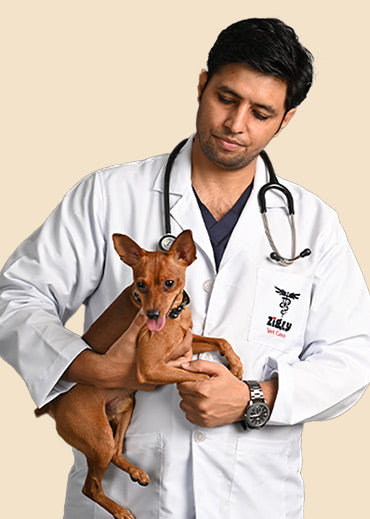Shih Tzus may be tiny, but their nutritional needs are anything but simple. With their silky coat, short muzzle, compact build, and sensitive stomachs, this mini breed needs a carefully crafted diet, not just any dog food off the shelf.
If you’ve ever wondered why your Shih Tzu’s energy, coat shine, or digestion seems to fluctuate, chances are the diet isn’t matching what their body demands. Here’s a deep dive into what makes their nutritional needs unique and how you can make sure they get the right balance each day.
Why a Generic Dog Food Doesn’t Work for Shih Tzus
Not all dog food is created equal, and definitely not for brachycephalic mini breeds. Shih Tzus often face issues like tear staining, digestive trouble, dental buildup, and inconsistent appetite. Regular kibble rarely addresses:
1. Short Muzzle, Difficult Bite
Shih Tzus don’t have the strongest bite because of their flat face and small jaw structure. Regular-sized kibble can be uncomfortable to chew, leading to:
-
Selective eating
-
Incomplete chewing
-
Higher chances of tartar buildup
They need smaller kibble size, easier texture, and nutrient-dense bites.
2. Sensitive Stomach & Food Intolerances
This breed is well-known for digestive sensitivities. Generic food often contains fillers, artificial flavours, and subpar ingredients that trigger:
-
Diarrhea or loose stools
-
Gas
-
Itching
-
Low appetite
A targeted, gentle, high-quality ingredient list is essential.
3. Coat & Skin Depend Heavily on Diet
Shih Tzus boast one of the most recognisable coats in the canine world. But it’s also prone to dryness, dullness, and matting if their food lacks:
-
Essential fatty acids
-
High-grade proteins
-
Zinc & vitamins
Their coat literally reflects what they eat.
4. Higher Calorie Requirement in Small Portions
A Shih Tzu burns calories quicker than larger dogs, yet their stomach is tiny. This means:
-
They require calorie-dense nutrition
-
More frequent meals
-
Balanced macros to prevent hypoglycemia
Generic food often doesn’t pack enough energy into small servings.
What Should a Shih Tzu Really Eat?
Let’s break down the essentials of a well-rounded, breed-conscious diet.
1. High-Quality Protein (Real Meat, Not By-Products)
Their body thrives on biologically appropriate proteins like chicken, lamb, turkey, or fish. Look for food where real meat appears first on the ingredient list.
Why it matters:
-
Supports muscle tone
-
Keeps coat shiny
-
Boosts immunity
2. Omega Fatty Acids for Coat & Skin Health
For a breed that’s all about the “look,” optimum coat nutrition is non-negotiable. DHA, EPA, and omega-6s are must-haves.
Benefits:
-
Reduced shedding
-
Less dryness
-
Helps prevent matting
-
Natural shine and softness
3. Digestive Support (Prebiotics, Probiotics & Gentle Grains)
Shih Tzus typically digest food better when there’s gut support in the formula.
Look for:
-
FOS/MOS prebiotics
-
Pumpkin
-
Rice or oats
-
Beet pulp
These help maintain firm stools and prevent stomach upset.
4. Small Kibble Size with Easy Chew Texture
Tiny jaws require tiny, optimised kibble. This helps with:
-
Proper chewing
-
Reduced tartar buildup
-
Better nutrient absorption
-
Higher acceptance
A texture that’s neither too hard nor too crumbly works best for seniors and puppies alike.
5. Controlled Fat for Steady Energy
Shih Tzus can get lethargic or hyperactive depending on the fat-to-carb balance. A controlled fat ratio ensures steady, clean energy without weight gain.
6. Vitamins & Minerals That Matter for This Breed
Focus on formulas rich in:
-
Vitamin E & C (immunity)
-
Zinc & biotin (coat health)
-
Calcium & phosphorus (bone strength)
-
Taurine (heart health)
Mini breeds especially benefit from antioxidant-rich diets.
Wet Food, Fresh Food & Treats: What Works Best for Shih Tzus?
Wet Food: A Hydration-Boosting Essential
Wet food can be especially helpful for Shih Tzus who are picky eaters or struggle with hydration. It offers a softer texture that is gentler on their jaw, adds aroma for better palatability, and helps maintain sufficient moisture intake.
You’ll find a variety of small-breed–friendly wet food options on Zigly, including recipes formulated for sensitive stomachs, balanced nutrition, and softer textures suited for brachycephalic dogs.
Fresh Food & Toppers: Great for Digestive and Skin Support
Fresh food such as gently cooked meals or natural toppers can elevate a regular kibble meal by adding:
-
Higher palatability
-
Better digestibility
-
Natural nutrients
Many pet parents add fresh-food toppers to help with tear stains, coat health, and appetite consistency. If you’re looking to experiment with safe, vet-approved toppers or fresh meal add-ons, Zigly offers curated options that pair well with small-breed kibble.
Treats: Must Be Mini, Soft & Digestive-Friendly
Shih Tzus respond well to training treats, but they must be:
-
Small in size
-
Soft-chew
-
Free from artificial fillers
Hard or oversized treats can strain their jaws and lead to choking or digestive issues.
To make treat selection easier, Zigly lists a wide range of soft, mini treats ideal for Shih Tzus, including natural chews, functional snacks, and training bites.
How Much Should a Shih Tzu Eat Daily?
An average adult Shih Tzu (3–7 kg) may need:
-
½ to 1 cup of mini-breed kibble per day, split into 2–3 meals.
Puppies require 3–4 small meals daily, while seniors may need low-fat, nutrient-dense meals.
Shop Now for Shih-Tzu Food Collection.
Conclusion
Shih Tzus aren’t just “small dogs”, they are a breed with unique nutritional demands. Their coat, digestive system, and jaw structure call for a diet crafted specifically for mini breeds.
With the right mix of quality protein, skin-supporting nutrients, small-sized kibble, and balanced fresh food or wet food add-ons, your Shih Tzu can thrive with consistent energy, a radiant coat, and better digestion.
If you’re looking for reliable, vet-backed options whether it’s mini-breed kibble, sensitive-stomach wet food, fresh toppers, or soft treats, Zigly offers a curated range that helps you make confident, informed choices for your little companion.




